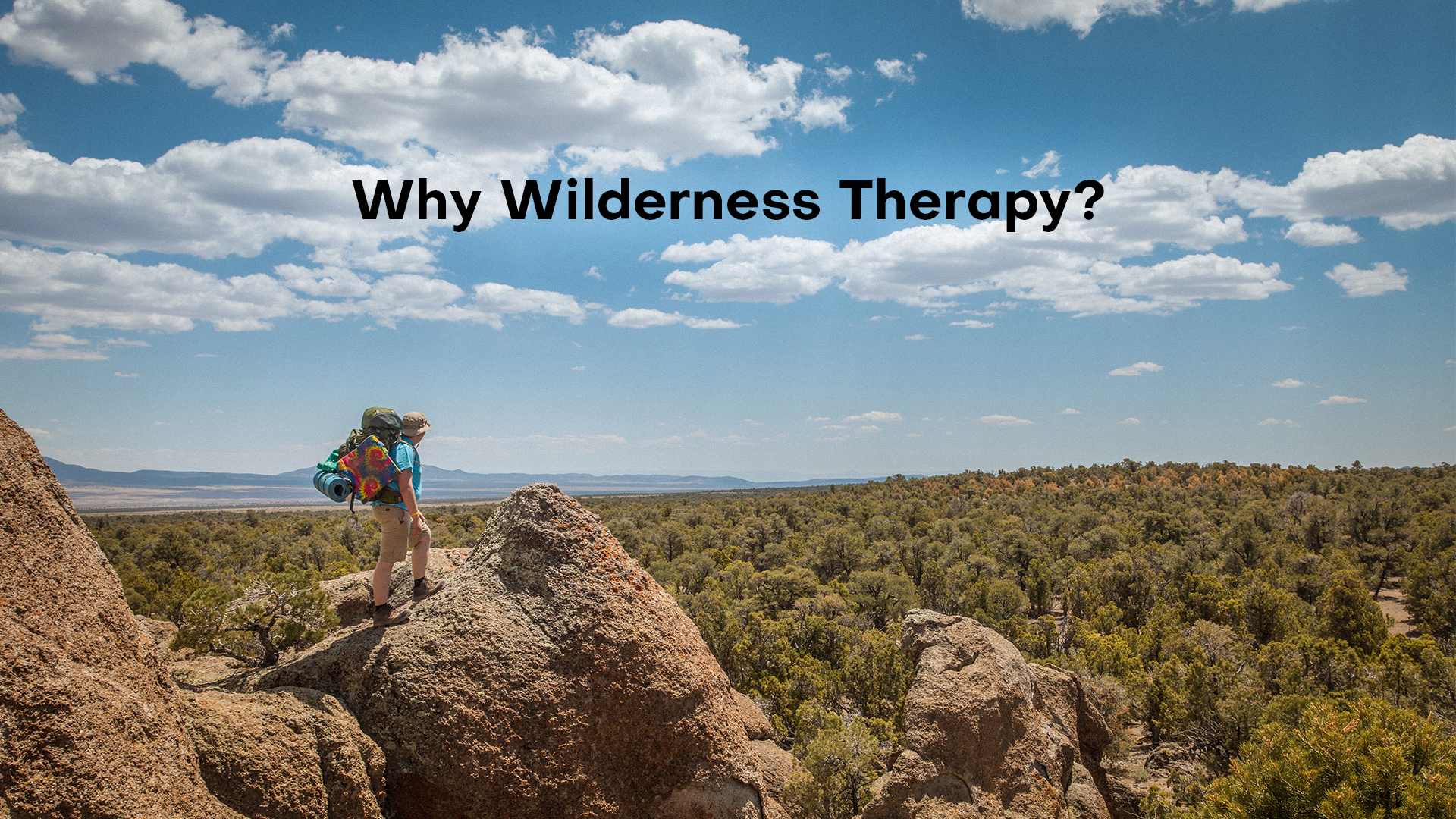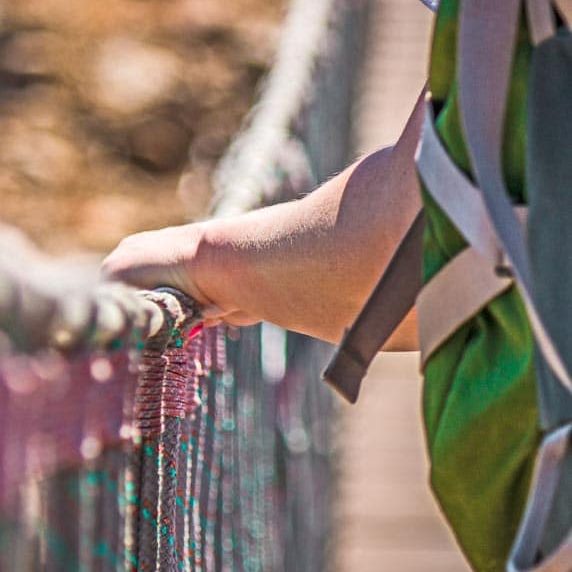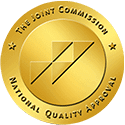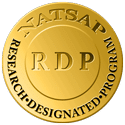
From Struggling to Succeeding: The Transformative Power of Teen ADHD Treatment
For teens with ADHD, finding the right treatment can be a challenge. But with wilderness therapy, you can give your child the support they need to overcome their challenges and achieve success. This innovative approach combines nature and ADHD treatment to create a truly transformative experience.
Take our ADHD test for teens and see if a wilderness therapy program is right for your family.
Teen ADHD can make life difficult for adolescents, impacting their academic performance, relationships, and overall well-being. As a concerned parent, it's essential to understand the disorder and the available treatment options to help your child overcome their symptoms and reach their full potential.
In this piece, we identify the hallmark signs and symptoms of ADHD in teens, explore the various types of ADHD, uncover its causes, examine the impacts it can have, and outline effective treatment options for teens and their families.
Types of ADHD in Teens
ADHD can be a complex disorder to navigate, especially in teenagers who are already facing numerous challenges as they navigate the complexities of adolescence. Understanding the signs of ADHD in teens is critical for parents as early recognition and treatment can make a significant difference in a teen's life. In this section, we'll discuss the different types of ADHD, and take a closer look at the most common symptoms of ADHD in teens.
ADHD Combined Type
Attention-Deficit/Hyperactivity Disorder (ADHD) Combined type, is a subtype of ADHD that affects both inattention and hyperactivity/impulsivity. Teens with this subtype of ADHD have symptoms from both of the other subtypes and may show any of the signs listed below.
Hyperactive-Impulsive ADHD
Attention-Deficit/Hyperactivity Disorder (ADHD) Predominantly Hyperactive-Impulsive type, is a subtype of ADHD that primarily affects teens' impulsivity and hyperactivity. Teens with this subtype of ADHD have a hard time sitting still and controlling their impulsive behaviors.
Some of the common signs and symptoms of hyperactive-impulsive ADHD in teens include:
- Fidgeting, squirming, and excessive physical activity
- Difficulty staying seated or remaining still for long periods of time
- Impulsive behavior, acting without thinking
- Talking excessively
- Interrupting others during conversation or activities
- Difficulty waiting their turn or standing in line
- Acting without considering the consequences
- Being impulsive in social situations
- Difficulty engaging in quiet leisure activities
- Engaging in dangerous or risk-taking behaviors.
Inattentive ADHD
Attention-Deficit/Hyperactivity Disorder (ADHD) Predominantly Inattentive type, is a subtype of ADHD that primarily affects teens' attention. Teens with this subtype of ADHD have difficulty focusing and paying attention to details and are often forgetful in daily activities. Due to its less disruptive nature, the inattentive manifestation of ADHD can often go unnoticed compared to the hyperactive-impulsive manifestation.
Some of the common signs and symptoms of inattentive ADHD in teens include:
- Difficulty paying attention or staying focused, even in tasks or activities that they find interesting
- Poor organizational skills and difficulty following instructions or completing tasks
- Forgetfulness or easily losing things
- Daydreaming and getting distracted easily
- Struggling to listen and process information
- Difficulty starting or finishing tasks
- Avoiding tasks that require sustained mental effort
- Being disorganized and losing items frequently
- Struggling to pay attention in class or during conversations
- Poor grades or problems with schoolwork.
ADHD Symptoms in Teens
Most people think of ADHD as a disorder where people can't focus. In reality, ADHD's inability to regulate attention affects almost every area of a teen's life. These uncommon signs of ADHD in teens may include:
- Executive dysfunction - difficulties in executive functioning, such as problems with initiating tasks, prioritizing, planning, organization, and self-monitoring.
- Emotional dysregulation - difficulty managing and regulating emotions, leading to unexpected or uncontrollable crying, angry outbursts, being oppositional or defiant, or mood swings. This may also be a result of:
- Low frustration tolerance - the inability to cope with frustration, discomfort, or inconvenience. People who have low frustration tolerance feel unable to “sit with” stress or difficult situations. As a result, they may react to frustrations by “acting out.”
- Trouble Putting Problem Size in a Relevant Context - difficulties accurately assessing the significance or importance of problems causing teens with ADHD to overreact or underreact to the size of the problem.
- Time blindness & poor time management - difficulty in estimating time accurately and using time efficiently, or difficulty in perceiving the passage of time accurately leading to problems with deadlines and punctuality.
- Poor future thinking skills - difficulties in considering or planning for the future.
- Rejection sensitivity dysphoria (RSD)- a condition characterized by intense shifts in emotions that are triggered by actual or perceived episodes of rejection, teasing, criticism (including constructive criticism), or persistent negative self-talk.
- Hyperfocus - an inability to regulate attention leading to an intense and prolonged focus on a specific task making transitions difficult when switching focus is necessary.
- Poor Social awareness or social skills - refers to difficulties in understanding and navigating social cues and relationships, leading to problems with communication and social interaction.
- Inconsistent situational awareness - difficulties in monitoring and understanding what is happening in a given situation.
- Poor perspective-taking skills - difficulties in understanding or considering the perspectives of others.
- Low motivation - a lack of drive or enthusiasm for activities, leading to procrastination and decreased productivity.
- Sensory processing differences - difficulties processing sensory information, leading to over- or under-sensitivity to certain stimuli, including:
- Sensory seeking - a desire to seek out stimulation through sensory experiences.
- Sensory avoiding - a tendency to avoid or be overwhelmed by sensory experiences like loud noises, intense flavors, certain textures, etc.
- Internal emotional hyperarousal - the majority of teens with ADHD experience emotional hyperarousal (a kind of internal hyperactivity) and 25% also experience stereotypical & observable hyperactivity.
- Insomnia or trouble sleeping - difficulty falling or staying asleep.
- Indecision or choice paralysis - difficulty making decisions, even in routine situations.
- refers to extreme indecision, leading to a fear of making the wrong choice.
- Sluggish cognitive tempo (SCT) - difficulties with attention and processing speed, leading to a slow or lethargic thought process.
- Maladaptive or negative coping mechanisms - unhealthy or ineffective ways of dealing with stress or difficult situations.
- Excessive technology use - excessive use of electronic devices and technology, such as spending excessive amounts of time on social media, gaming, phones, or screens leads to difficulties with interpersonal communication and real-life problem-solving.
- Difficulty with self-directed talk - difficulties in regulating or controlling self-talk, leading to negative self-talk or repetitive thoughts.
- Weak episodic memory - difficulties with memory for events or personal experiences.
- Difficulty with unexpected change - refers to difficulties adapting to changes or unexpected events.
Signs of ADHD in Teenage Girls
Although the core symptoms of ADHD are consistent across gender, the way they present can differ greatly between boys and girls.
According to recent studies, girls with ADHD are more likely to present with inattentive symptoms, while boys tend to exhibit more easily identifiable hyperactive-impulsive symptoms. Girls with the inattentive form of ADHD are often face misconceptions and stereotypes due to the subtlety of their symptoms, which can lead to misdiagnosis of their ADHD behavior as moodiness or awkwardness.
Other uncommon signs of ADHD in teen girls may also include
- coexisting depression and anxiety
- excessive daydreaming
- shyness
- perfectionism
- difficulties in romantic relationships
- difficulties in maintaining friendships
- a lack of organization in at least one aspect of their life such as a messy living space or disorganized personal area.
Teen ADHD Symptom Highlights
When most people think about ADHD, the symptoms that most often come to mind are hyperactivity and an inability to control attention. ADHD also affects several crucial areas such as impulsivity, emotional regulation, executive functioning, and rejection sensitivity, which require closer examination.
Executive functioning refers to the cognitive processes responsible for time management, planning, organizing, initiating, and completing tasks. Teens with ADHD often struggle with executive dysfunction, which affects their ability to prioritize tasks, initiate and complete projects, stay organized, and manage their time effectively. Executive dysfunction can result in significant difficulties in almost every area of a teen's life, including education, interpersonal relationships, and self-esteem. When a teen's ADHD symptoms persistently cause major disruptions in everyday life, seeking treatment for executive dysfunction becomes critical.
ADHD impulsivity is characterized by impulsive behavior and a lack of planning, forethought, and self-control. In teens, ADHD impulsivity can cause difficulties in various areas of life, such as school performance, social interactions, and decision-making. This can lead to academic and behavioral problems, including poor grades, impulsively acting out or engaging in dangerous behaviors, and trouble making and maintaining relationships with peers and family members. Additionally, impulsivity can also increase the risk of accident-proneness and other negative outcomes in teens with ADHD.
ADHD impulsivity can also have negative impacts on teenage relationships. These teens may struggle with blurting out thoughtless comments, interrupting others in conversations, acting impulsively without considering consequences, or having trouble controlling their temper. These actions can damage or strain relationships with friends, romantic partners, family members, or peers. In order to effectively gain ADHD impulse control, it is important for teens to receive proper treatment and support to learn healthy coping mechanisms and emotional regulation skills.
Emotional regulation refers to the process of managing and controlling one's emotions in order to maintain a healthy and stable emotional state. It is a key aspect of mental health and well-being and involves the ability to recognize, understand, and express emotions in appropriate ways.
ADHD can impact emotional regulation in several ways. Individuals with ADHD may have difficulty controlling impulsive and reactive behaviors, which can lead to difficulties managing emotions. They may also have trouble recognizing and interpreting their own emotions and the emotions of others, leading to misunderstandings and social challenges. Additionally, the symptoms of ADHD, such as impulsiveness and inattention, can make it difficult for individuals to maintain control over their emotions, leading to feelings of irritability, frustration, and anger. Effective treatment for ADHD often includes strategies for improving emotional regulation, such as therapy and mindfulness practices, to help individuals manage their emotions and improve their overall well-being.
Teens with rejection sensitive dysphoria (RSD) can experience intense shifts in emotions that are triggered by actual or perceived episodes of rejection, teasing, criticism (including constructive criticism), or persistent negative self-talk prompted by perceived failures.
Due to issues with impulsivity, executive dysfunction, and emotional regulation, teens with ADHD are subject to frequent microaggressions from others in their daily lives. From being criticized for taking too long to get ready in the morning to receiving disapproval from teachers for incomplete homework to facing negative reactions from peers during emotional outbursts, these teens are subjected to numerous "rejections" on a daily basis.
As a result, teens with ADHD have a heightened sensitivity to others' emotions, sometimes sensing them even before the other person is conscious of them. This sensitivity often leads to a low tolerance threshold for any perceived rejection. This intense emotional sensitivity can significantly impact a teen's mental health and relationships, making it important for those with ADHD to receive treatment for RSD.
What Causes ADHD in Teens?
The exact cause of ADHD is not fully understood, but research suggests that a combination of genetic, environmental, and brain function factors may be involved. Some possible causes of ADHD include:
- Genetic factors: Studies have shown that ADHD is largely hereditary and is caused by a complex interplay of genes that affect the brain's development and function.
- Imbalances in neurotransmitters: ADHD has been linked to imbalances in neurotransmitters (specifically dopamine), which are involved in regulating attention, focus, and the reward systems in the brain.
- Structural differences in the brain: Research has also found structural differences in the brains of individuals with ADHD, including smaller prefrontal cortexes and basal ganglia.
- Environmental factors: Exposure to toxins or some medications during pregnancy or early childhood, being born prematurely, or experiencing trauma or abuse, may also contribute to the development of ADHD.
You Are Not Alone
RedCliff Ascent is there for you and your family.
Signs Your Teen May Need Treatment for ADHD
Recognizing the signs that your teenager may need ADHD treatment can be a crucial step towards managing their symptoms and improving your whole family's quality of life.
ADHD can present itself in many different ways, and it can be challenging to know when it's time to seek help. In this section, we'll explore some common signs that indicate your teenager may require professional treatment, and how addressing these symptoms can lead to improved functioning and a more fulfilling life.
Here are some signs of your ADHD teen may need treatment:
- Negative coping mechanisms and behavioral problems extreme enough they are cause lasting damage either to your family or to your teen's future.
- Escalating impulsive or risky behavior that is dangerous and can cause lasting damage to your family, home, community, or your teen's health and future.
- Difficulty regulating emotions and handling stress to such a degree that it has damaged most of your teen's relationships and affected most areas of their teen life. If you feel that giving them an opportunity to pause, gain the necessary emotional regulation skills, and reset their life would be a relief to them and your family, they may need a treatment program.
Parents should consider seeking treatment for their teenager if their struggles with ADHD are having a significant impact on their daily life, or are irreparably damaging their future. If the behaviors and symptoms persistently interfere with daily life, it is important for parents to seek help from a mental health professional who can diagnose and treat ADHD.
Importance of Early Intervention & Treatment for ADHD
Early intervention refers to recognizing the warning signs of ADHD in teens and acting before it gets worse. Early intervention and treatment can play a crucial role in mitigating the negative impact of ADHD on teenagers. Some of the benefits of early intervention for ADHD in teenagers include:
- Improving academic outcomes: early treatment can help teens with ADHD develop the skills to stay organized and focused in school, leading to better grades and a higher likelihood of success.
- Alleviating symptoms: early treatment can help to alleviate the most severe symptoms of ADHD, improving the overall quality of life for the teenager.
- Preventing future problems: early intervention can help to prevent the development of more serious mental health issues, such as depression and anxiety, and reduce the risk of long-term damage to the teenager's future prospects.
- Improving family dynamics: early treatment can help to improve communication and understanding within the family, reducing conflict and stress for both you and your teenager.
- Building resilience: early treatment can help to develop coping skills and resilience in the teenager, allowing them to better manage future stressors and challenges.
- Enhanced relationships: Teens with ADHD can benefit from learning social skills, such as how to regulate emotions and control impulsivity, which can improve relationships with friends, family members, and future romantic partners.
- Increased self-worth: Early treatment can help teens with ADHD feel more confident in their abilities, which can boost self-esteem and help them lead happier, more fulfilling lives.
- Improved quality of life: With the right support, teens with ADHD can learn to manage their symptoms and lead fulfilling, productive lives. Early treatment can set them on this path.

Not Seeking ADHD Treatment Can Be Harmful: The Effects of Untreated ADHD on Teens
Lack of teen ADHD treatment may stem from the stigma associated with mental health, lack of access to care, or simply not knowing where to go for help. But the longer it takes for your teen to receive help, the more difficult their recovery can be. Delays in treatment time can cause other serious consequences too. Without treatment, ADHD can have the following effect on teens:
- Academic difficulties: In the short term, teens with untreated ADHD may struggle with paying attention in class, staying organized, and completing homework assignments. This can lead to poor grades, difficulty keeping up with their peers, and low self-esteem. In the long term, untreated ADHD can limit opportunities for higher education and limit career options.
- Behavioral problems: Teens with untreated ADHD are more likely to display impulsive and hyperactive behavior, which can lead to problems in their relationships with friends, family members, and teachers. They may also engage in risky behaviors, such as reckless driving.
- Emotional problems: Teens with untreated ADHD are more likely to experience anxiety, depression, and mood swings, which can further exacerbate their symptoms. They may also struggle with low self-esteem and feelings of hopelessness and frustration.
- Difficulty in relationships: Teens with untreated ADHD may struggle with forming and maintaining meaningful relationships, leading to feelings of isolation and loneliness. This can also impact their future relationships, including romantic partnerships and friendships.
Early Intervention Is Important For Healing Teens With ADHD
Early intervention and treatment can greatly benefit families of teens struggling with ADHD by providing the tools, resources, and support necessary for the teen to effectively process their feelings and emotions, and manage their ADHD. Providing a safe and supportive environment for the teen to heal can also improve family dynamics and strengthen family bonds.
Early intervention also helps parents and families learn coping skills and healthy ways to manage their own emotions, which can lead to better mental health outcomes in the future. By addressing ADHD-related problems early on, families can build resilience and learn to navigate life's challenges together in a healthy and effective way, promoting positive outcomes and reducing the impact of this serious problem.
Teen ADHD Treatment: What Are Your Options?
There are several treatment options available to parents of teens struggling with ADHD:
- Outpatient therapy: This type of therapy involves regular sessions with a mental health professional, typically once a week or more.
- Day treatment: Day treatment programs provide intensive therapy and support for teens but allow them to return home at night.
- Inpatient treatment: Inpatient treatment involves hospitalization for a period of time, typically 1-2 weeks, and provides 24/7 supervision and care.
- Residential treatment: Residential treatment programs provide round-the-clock care in a therapeutic and structured environment, typically lasting several months.
- Wilderness therapy: This type of therapy combines traditional therapy with outdoor activities, such as hiking and camping, and can be a highly effective form of treatment for teens struggling with ADHD.
The type of treatment that is most appropriate for a teen will depend on the severity of their symptoms, their underlying mental health conditions, and other factors. It is important to consult with a mental health professional to determine the best course of action.
What is Wilderness Therapy?
Wilderness therapy is a type of ADHD treatment program that uses nature, wilderness activities, and therapy as a means to address and heal ADHD-related struggles in teens. Wilderness therapy takes full advantage of the outdoors and its ability to foster change. The outdoors provide teens with a contrasting environment to observe aspects of themselves that are often overlooked in traditional talk therapy.
As the leader in wilderness therapy, RedCliff Ascent is an effective treatment program for struggling teens aged 13-17. RedCliff Ascent’s safe, nurturing, and supportive environment provides teens the skills they need to cope in a healthy and age-appropriate way.

Benefits of Wilderness Therapy for Teens with ADHD
Being immersed in nature can have a profound impact on a teenager. It improves their mental, emotional and physical health. When combined with a research-backed clinical approach, a therapeutic wilderness experience helps teens heal from ADHD-related struggles. Here are five specific benefits your family can expect to see while your teen is in wilderness therapy.
For teens with ADHD, the effects can be amplified by accompanying mental health problems or an absence of effective coping skills. Research indicates accurate mental health assessments can lead to a 20% reduction in treatment.
Wilderness therapy provides a novel and challenging environment that disrupts the unhealthy patterns that contribute to your teen's struggles with ADHD or are a result of your teen's ADHD.
Teens living with ADHD often struggle to engage in ongoing treatment and have very high dropout rates. Poor engagement may lead to worse clinical outcomes, with symptom relapse and rehospitalization. Our research shows that even teens who have been resistant to therapy engage in the process while in wilderness therapy.
RedCliff Ascent’s safe, nurturing, and supportive environment provides teens with the social and emotional learning skills they need to re-engage in healthy development.
If you're like most parents, you don't want to just get rid of your teen's struggles with ADHD. You want them to eventually become thriving, independent adults equipped with the skills necessary to succeed outside your home. These include:
Resilience - the ability to successfully adapt to challenging situations despite risk and adversity. Resilience helps us develop social competence, problem-solving skills, critical consciousness, autonomy, and a sense of purpose.
Leadership & Social Competence skills include qualities such as:
- responsiveness, especially the ability to elicit positive responses from others
- flexibility
- empathy
- communication skills
- and a sense of humor
Problem-solving skills - the ability to plan; to be resourceful in seeking help from others; and to think critically, creatively, and reflectively.
Autonomy is having a sense of one’s own identity and an ability to act independently and to exert some control over one’s environment, including a sense of task mastery, internal locus of control, and self-efficacy. The development of resistance (refusing to accept negative messages about oneself) and of detachment (distancing oneself from dysfunction) serves as a powerful protector of autonomy.
Sense of Purpose and a belief in a bright future, including goal direction, educational aspirations, achievement motivation, persistence, hopefulness, optimism, and spiritual connectedness.
98% of students report feeling connected to RedCliff's staff and one or more of their peers.
Upon completion of the program, 86% of parents reported improvement in their child's problems when compared to when they entered
12 months after treatment 86% of parents reported that their child's problems are improved since they completed treatment
How Does Wilderness Therapy Work?
RedCliff Ascent has been offering teen ADHD treatment for almost three decades, consistently conducting research throughout that time. Our research has identified seven key principles that have proven to significantly aid both your teen and your family heal from the effects of ADHD.

Healthy relationships serve as the cornerstone for growth, development, and ultimately a thriving future.
Your teen will reside in a small group where they can receive and offer constructive feedback within a safe and supportive atmosphere. This secure setting allows them to cultivate healthy relationships with both their peers and mentors, providing essential tools for conquering the effects of teen ADHD.
Successful ADHD treatment depends on personalizing its approach to your teen's individual struggles, strengths, personality, cultural background, and preferences. Our evidence-based treatment approach seamlessly blends these crucial elements to create a customized plan specifically tailored to your teen's unique needs.
Many students who have gone through RedCliff Ascent's wilderness therapy program have reported that the unique and demanding environment gave them a fresh perspective on their life and everything they previously knew.
Novel physical environments are a place of contrast that confront the world views your teen takes for granted. This helps your teen to see with a fresh perspective and see new options available to them. Growth occurs outside of the comfort zone and is accelerated in environments that push physical and mental limits.
The impact of your teen's school ADHD extends beyond just them, affecting the entire family. That's why our approach to treatment not only focuses on your teen but includes the entire family in the healing process. Parent involvement and family support play crucial roles in your teen's progress and successful adjustment after treatment.
Communicating through handwritten letters provides a novel and powerful way to work through your family's struggles. You will also have access to our parent resource library, a weekly support call with other parents like you, as well as a weekly session with your child's therapist.
At RedCliff Ascent, we understand the far-reaching impact of ADHD on a teenager's life. Our treatment approach is comprehensive and integrated, aiming to address all aspects of your child's well-being. Our multidisciplinary team, including mentors, therapists, medical professionals, academic directors, nutritionists, and more, come together weekly to collaborate and ensure your child receives the holistic support they need for a full recovery from school refusal.
Teens grappling with ADHD often lack self-confidence. By imparting foundational wilderness living skills, these teens can develop a newfound trust in themselves that extends to all areas of their life, from home to school and beyond. The hands-on experience of successfully navigating the wilderness boosts their confidence and improves their ability to thrive in all aspects of their life.
A ceremony is a powerful tool that can change your teenager's life. A ceremony is a community celebration or commemoration often having symbolic importance to the people performing it. A ceremony recognizes your teen's inner growth and experiences and attaches it to a physical symbol that your teen can take with them. A ceremony can help your teen validate and internalize the growth they have achieved.
What Our Clients Say About RedCliff Ascent
I’d like to let you know how delighted I am with the RedCliff program and how impressive the hard work and dedication of the staff is...We feel that your program has very probably saved this child’s life and given us back our son.
- Kathy
We are very pleased with [our daughter's] self-improvements. A year ago we would not have dreamed all this to be possible! The path she head down was self-destruction. The impact of the RedCliff program is what turned [her] around. Our headstrong daughter was able to take stock of her past behavior, deal with her anger towards us, and begin to move in a more positive direction.
Even though sending her to RedCliff was a gut-wrenching decision, we know we did the right thing. We are thankful for the help and insight you gave to her and us.
- Clark and Irene
Since [our son] went to RedCliff we have all been transformed, but none as much as he. All of his teachers had nothing but good things to say about him. There have been no behavior issues at school this year. As a matter of fact, his teachers stated that they would like it if they had more students like Rob in their classes. I cried again at this meeting, but this time they were tears of joy.
- Julie


Backed by The Joint Commission which ensures programs adhere to the highest quality of clinical and medical practices.

Designated as a NATSAP Research Program, showing our commitment to well-researched practices in our program.

We are also OBH Accredited through the Association of Experiential Education (AEE) which regulates wilderness therapy practices.

Full member of the National Association of Therapeutic Schools and Programs (NATSAP), which ensure regulation of programs that serve children and adolescents.

RedCliff Ascent is fully licensed in the state of Utah.

Backed by the Association of Experiential Education (AEE) that ensures programs maintain appropriate professional behavior and risk management.

Founding member of the OBH Council (Outdoor Behavioral Healthcare Council).

Founding member of Choose Mental Health, guiding families with questions about mental health.
Every teen’s strengths and challenges are different. Complete the no-obligation teen anxiety assessment below to help us understand your family’s needs.
We respect your privacy and will never share your information.
We’re here to help - take the first step and contact us to see if wilderness therapy could be the path to healing for your family.
